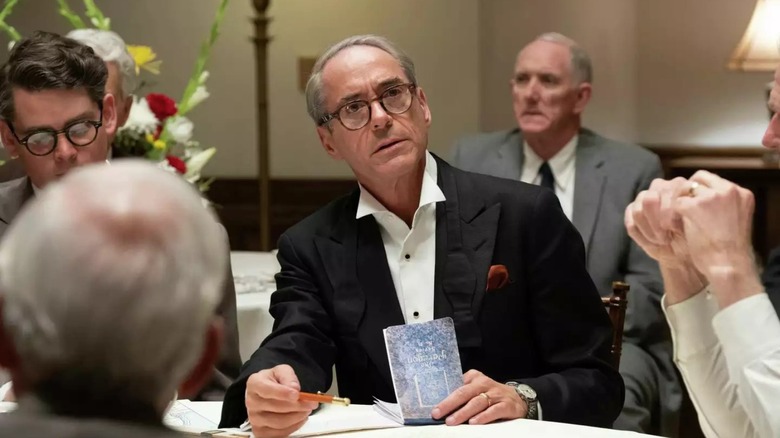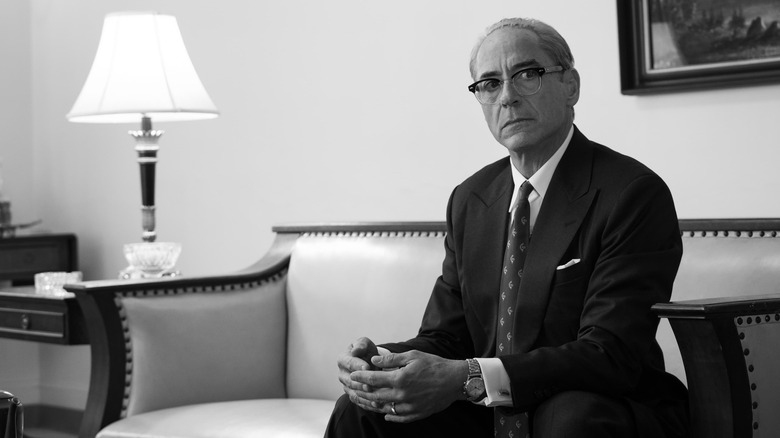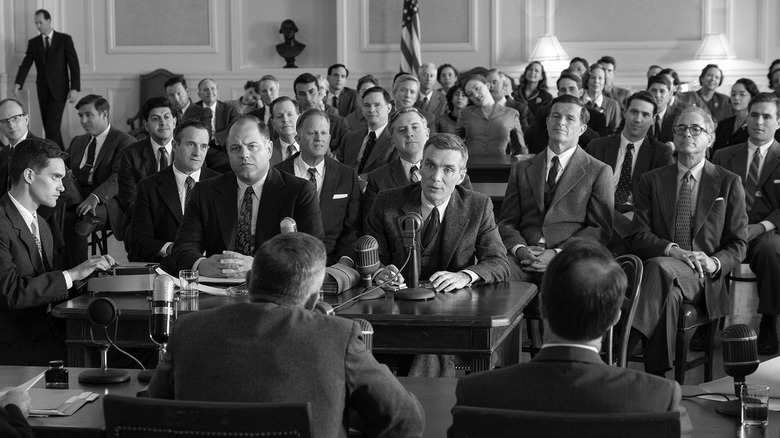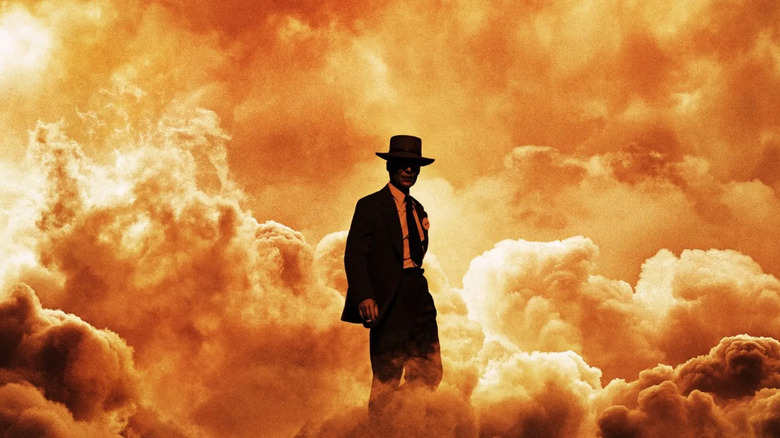Robert Downey Jr. Kinda Saw His Oppenheimer Character As The Film's Hero
In Christopher Nolan's new film "Oppenheimer," a biography of one of the chief architects of the atomic bomb, Robert Downey, Jr. plays Lewis Strauss, a real-life politician who spent a portion of the McCarthy era becoming increasingly suspicious of Communists in the American political system. He launched a campaign against Oppenheimer years after the invention of the bomb, hoping to have the scientist's security clearance revoked. Strauss, in public, claimed to hate Oppenheimer because of palpable Communist ties and sentiments he had expressed in sympathy with the Communist party. Nolan's film, however, posits that Strauss was hoping to pillory and ostracize Oppenheimer for personal reasons, having been humiliated by the scientist at a congressional hearing years before.
The Strauss character is vital to "Oppenheimer," as he seems to serve as a stand-in for American politics as they have come to be in 2023. Nolan seems to point out that many politicians of the modern day are following Strauss' template of pettiness and revenge. No one is interested in governing, advancing legislation, or doing anything that might be considered righteous. Most political actions, Nolan argues, are driven by spite. Given that humankind just invented and exploded a nuclear bomb, we have essentially lost our souls. Oppenheimer invented the most immoral device imaginable. The politicians who used it, meanwhile, never stop to consider it. They merely move forward with their puny wrath and idiotic, power-mad politicking.
Many might consider Strauss to be the central villain of the piece, but Downey disagrees somewhat. In a recent interview with Vulture, Downey recalls his meeting with Christopher Nolan, and how his take on Strauss startled the director. Strauss, he said, was not a villain, but a patriotic American politician. In Downey's words, his take raised a few eyebrows.
Strauss, the patriot
Downey was enthused to meet with Nolan, saying that any questions the director had about meeting at his home for a script reading would be answered with words beginning with "Y," as in "yes." Nolan invited Downey over to read "Oppenheimer" and to see if he might be interested in playing Strauss, and if he was previously familiar with the historical figure. Downey, as it so happens, was. He said:
"It has been a longtime contemplation, verging on obsession, of mine: mid-century Cold War and all the characters involved. I had a previous fair understanding of Strauss because I was fascinated with the mechanics of warfare, particularly in the Pacific theater in World War II. The first time I saw his name in print was regarding the proximity fuze and its development."
A proximity fuze is a sensor used in bomb-making that can tell when a payload is close enough to its target to explode and do actual damage. Proximity fuzes were first used in bombs during World War II.
Downey's immediate take on the script was that Strauss and Oppenheimer were close colleagues with something of an antagonistic mentor/prodigy relationship similar to the one seen in another notable Hollywood biopic from 1984, namely Miloš Forman's "Amadeus." This, he said, was a take Nolan didn't expect. In Downey's words:
"I challenged a little bit the Mozart-Salieri of it all. I said, 'I'm not sure in some ways that Strauss isn't a bit the hero here,' which kind of raised an eyebrow on Chris. I half-jokingly challenged him on whether Admiral Strauss hadn't done everything that any patriotic American would've done. And he said, 'Well, this will be a wonderful ongoing dialogue. So, will you do the film?' And he's Chris Nolan, so he's not asking your fricking agent."
Strauss, the man with pride
Downey argued that Lewis Strauss wasn't a petty man, but a principled man who possessed a great deal of pride. Nolan may have presented Strauss as a man motivated by spite, but it was Downey's job to turn him into a person that he could relate to. When asked what he personally brought into the role, Downey was quick to point out that playing Strauss was actually a matter of dismantling. What are the very basic, very real, very relatable motivations for someone like Strauss? The actor said:
"Technically it wasn't really about what to add on; it was about what to remove so that aspect of all of us can emerge — a nose-to-the-grindstone public servant. Someone who is conservative for all the right reasons. One who has a very strong moral psychology, but also someone who is human and does not like to be slighted, does not like to be taken lightly, does not wish to be unnecessarily embarrassed, even if we're in the presence of a genius."
Downey pointed out that Strauss was an assistant to President Hoover, put himself through college, and stood against a certain kind of political thinking he perceived as tyranny. Strauss' spite at being humiliated by a scientist, he feels, would wound anyone in that position.
"Oppenheimer" ends with the Strauss story arc, leaving audiences bitter about humanity in addition to feeling existential dread over living on the same planet with a bomb that can kill literally everyone. When asked about the bitter taste that might leave in the audience's mouths, Downey felt that it was petty rivalries that sour the world, not necessarily political viewpoints.
Destructive explosions
Is "Oppenheimer" a leftist or a rightist movie? Knowing Nolan's personal politics as well as J. Robert Oppenheimer's, one can easily see it as left-leaning. Downey, however, ached for more nuance, feeling that bitterness between the Left and the Right way up at the top is what's really doing damage to all the voters and citizens down below. In his words:
"It's that thing when there is either too liberal or too conservative a disposition, it's us, the citizens, that wind up paying the price for these frictions. Lewis — consciously or not, solely or not, maybe just as a sign of the times — succeeded in getting Oppenheimer canceled. Then, those who felt Oppenheimer was wronged waited for the perfect moment to cancel Strauss, right when he was about to be at the precipice of his life's achievement."
In other words, the rivalry between Oppenheimer and Strauss ultimately had nothing to do with who was right or wrong, or who was right or left. It had everything to do with wasting time and resources to attack a man for personal reasons. Was Oppenheimer a dangerous Communist? For Strauss, perhaps. But not for the rest of the world. Downey finished:
"Obviously, Oppenheimer's achievement was global. Strauss's achievement had been personal. And still, to this day, many will never know all the earlier contributions that Admiral Strauss made that were significant and have made this a better, safer world. But there you have it, buddy. Nothing new under the sun."



